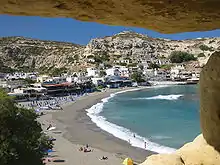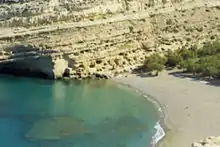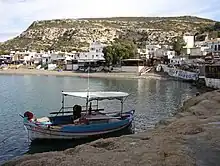Matala, Crete
Matala (Greek: Μάταλα) is a village located 75 km south-west of Heraklion, Crete, Greece. Matala is part of the community of Pitsidia within the municipal unit of Tympaki, Faistos municipality, Heraklion regional unit.

History


The artificial caves in the cliff of the Matala bay were created in the Neolithic Age. Matala was the port of Phaistos during the Minoan period. In the year 220 BC, Matala was occupied by the Gortynians, and during the Roman period, Matala became the port of Gortys. It has been suggested that the caves were once used as tombs, but it is more likely that they were used as living spaces, given their volume (corpses do not need that much room to walk around). One of the caves is called "Brutospeliana" because according to the legend it was frequented by the Roman general Brutus.
Matala was then a fishing village. In the 1960s, the caves were occupied by hippies[1] who were later driven out by the church and the military junta. Matala is now a heavily built tourist destination relying on coach tours and summer visitors. There are many gift shops and bars. Matala's hippie history relives during the 3 days Matala Beach Festival, every June (since 2011).[2]
Mythology
When Zeus seduced the princess Europa in the form of a white bull, he crossed the sea and brought her to the beach of Matala. There he changed into an eagle and flew her to Gortys where he had sex with her.
Climate
Matala has a hot-summer Mediterranean climate (Köppen climate classification: Csa). Matala experiences hot, very dry summers and very mild, wet winters.
| Climate data for Matala (1971-2000 modelled normals) | |||||||||||||
|---|---|---|---|---|---|---|---|---|---|---|---|---|---|
| Month | Jan | Feb | Mar | Apr | May | Jun | Jul | Aug | Sep | Oct | Nov | Dec | Year |
| Average high °C (°F) | 15.79 (60.42) |
15.57 (60.03) |
16.79 (62.22) |
19.93 (67.87) |
23.79 (74.82) |
27.88 (82.18) |
30.10 (86.18) |
29.59 (85.26) |
27.09 (80.76) |
24.13 (75.43) |
20.28 (68.50) |
17.49 (63.48) |
22.37 (72.27) |
| Daily mean °C (°F) | 12.57 (54.63) |
12.40 (54.32) |
13.80 (56.84) |
16.76 (62.17) |
20.52 (68.94) |
24.64 (76.35) |
27.14 (80.85) |
26.58 (79.84) |
24.41 (75.94) |
20.84 (69.51) |
17.47 (63.45) |
14.83 (58.69) |
19.19 (66.54) |
| Average low °C (°F) | 10.41 (50.74) |
10.14 (50.25) |
10.84 (51.51) |
13.08 (55.54) |
16.32 (61.38) |
19.85 (67.73) |
22.78 (73.00) |
22.91 (73.24) |
20.36 (68.65) |
17.80 (64.04) |
14.44 (57.99) |
11.87 (53.37) |
15.88 (60.58) |
| Average precipitation mm (inches) | 123.01 (4.84) |
78.86 (3.10) |
52.39 (2.06) |
16.90 (0.67) |
5.71 (0.22) |
0.66 (0.03) |
0.14 (0.01) |
0.16 (0.01) |
7.31 (0.29) |
34.72 (1.37) |
69.58 (2.74) |
101.56 (4.00) |
491.00 (19.33) |
| Mean monthly sunshine hours | 128.27 | 143.70 | 206.30 | 260.49 | 320.81 | 371.45 | 396.34 | 368.10 | 287.69 | 231.73 | 172.93 | 130.33 | 2,955.2 |
| Source: Hellenic National Meteorological Service[3] | |||||||||||||
In popular culture
- In Command & Conquer: Generals Zero Hour, the USS Reagan, along with the carrier support group docked in Matala and the naval base on the island, is destroyed by GLA forces .
- In Simon Scarrow's historical adventure novel, The Gladiator, the protagonists beach their damaged ship just outside Matala after it is damaged by a tsunami.
- Canadian singer and musician Joni Mitchell's experiences with the Matala hippies were immortalised in her songs "Carey" and "California", on her 1971 album "Blue". She spent several weeks living in the Matala caves during the summer of 1969.[4]
Notes
References
- Thompson, Thomas. "Crete: A Stop in the New Odyssey", Life, Chicago, 19 July 1968. Retrieved on 2010-05-25.
- www.matala.nl. "
- "Matala Climatic Data (1971-200 modelled normals)". Hellenic National Meteorological Service. Retrieved 27 June 2021.
- Chiasson, Dan. "Joni Mitchell's Openhearted Heroism". The New Yorker. Retrieved 2020-05-26.
External links
 Media related to Matala at Wikimedia Commons
Media related to Matala at Wikimedia Commons- Stories about Matala in the sixties and seventies